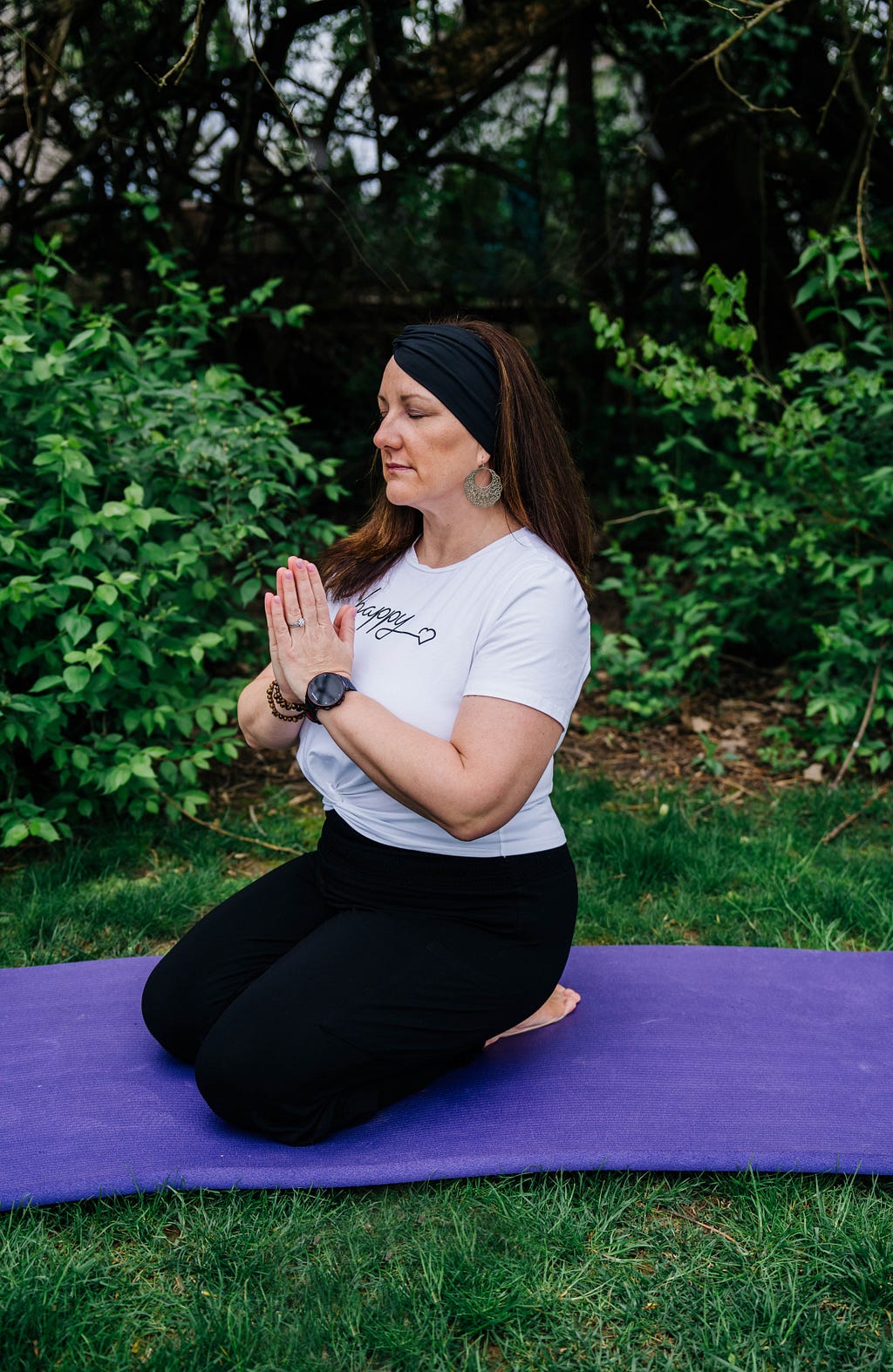An Interview With Wanda Malhotra
Accountability — It’s ok to have a misstep, we all do, but we need to be able to tell someone about it so that we can pick ourselves up and get back on track. We need someone who will cheer us on and someone who will help us up.
In a world where the journey towards sobriety is often challenging and deeply personal, understanding the pathways and strategies for achieving and maintaining sobriety is crucial. This series aims to provide insight, encouragement, and practical advice for those who are on the road to recovery, as well as for their loved ones and support networks. As a part of this series, I had the distinct pleasure of interviewing Tiffany Hopkins, LISW-S, CHC
Tiffany Hopkins is a Licensed Independent Social Worker and Certified Health Coach. She has more than 20 years of experience helping those who struggle with mental illness. Currently, Tiffany owns a private practice where she helps clients who are suffering with anxiety, depression and alcohol use disorder. She also owns a sober health coaching business where she focuses her work on helping Christian women change their relationship with alcohol as a part of their overall health and wellness.
Thank you so much for joining us! Before we dive in, our readers would love to “get to know you” a bit better. Can you tell us a bit about your ‘backstory’?
Sure! I have always been intrigued about why people do what they do and have had a passion for helping those who are less fortunate. This led to me receiving my BA in psychology and a Master’s in Social Work. My journey has had many ups and downs including a personal struggle with panic disorder and substance use. It is because of this that I am able to relate to my clients both personally and professionally and I can really connect with them on a deep level.
Can you share with us the most interesting story from your career? Can you tell us what lessons or ‘takeaways’ you learned from that?
The most interesting story is that I too am a “client”. I am “proof” that you can succeed and be resilient despite difficult times. I now have almost four years of complete sobriety and can really relate to my clients. This is more so because of my own experience rather than the degrees on my wall. People have stereotypes of what mental illness or substance abuse looks like and they could not be farther from the truth. Mental illness and substance abuse looks like the lawyer you just hired or the doctor you just saw for your surgery. It may be the mom at your church or the police officer who just pulled you over. We come in all different shapes, sizes, colors, socioeconomic status and genders. We all have struggles.
You are a successful individual. Which three character traits do you think were most instrumental to your success? Can you please share a story or example for each?
I think honesty is the most important character trait. It was not until I was honest with myself and others that I began to seek help and start to heal. We cannot hide from our hurts. Relatability is another character trait that is vital to a therapeutic relationship. If clients cannot relate to you, then they may feel disconnected or feel like there is a power struggle going on. Clients need to feel as though they are not alone in their struggles. Lastly, empathy and compassion are extremely important character traits to have in any career or relationship. Without this, you are unable to fully understand others and you will create a wall around you. Some may find that you are unapproachable and you will again disconnect with others.
Are you working on any exciting new projects now? How do you think that might help people?
Currently I am working on a new workshop for my members called “Balanced Living: Alcohol Awareness and Anxiety Management”. I am combining my two specialties to help people who want to change their relationship with alcohol but continue to go back to drinking because they start to feel the symptoms of anxiety. I will be teaching them about the negative effects of alcohol on anxiety and how drinking alcohol makes your anxiety worse. In the fall I will also be launching my podcast called “Sober Is Beautiful”. I am so excited to be able to share my personal story and how God has taken my pain and turned it into my purpose. I hope to interview other success stories so that listeners can hear themselves and know that there is hope.
Ok, thank you for all that. Now let’s shift to the main focus of our interview. How would you advise individuals who are contemplating the journey to sobriety but might be hesitant or unsure about taking the first step? Are there key considerations or strategies that can make this initial phase more manageable?
Absolutely. My advice is to tell someone you trust about the struggles you are having. This person needs to be someone who can listen and not judge. If you do not know of anyone like that then reach out to support groups in your area. There is something very freeing about being open and honest. It is like a weight has been lifted off of you. Remember, that they have struggles too but you are the courageous one because you are sharing your struggles and asking for help. If you are more of a “pen to paper” type person, then I would suggest just doing a simple pros/cons list. What are the pros to changing your relationship with alcohol and what are the cons? What will happen if you quit? What will happen if you continue? Sometimes just having this visual is helpful. Finally, ask yourself WHY you want to quit? Is it for you? Your family? You need to identify this because you can lean into your WHY when you are having thoughts of drinking.
Sobriety often comes with its unique set of challenges. Can you share insights on how individuals can effectively navigate obstacles or triggers that may arise during their journey? Are there specific tools or support systems that you find particularly helpful in overcoming these challenges?
My first line of defense is education. If you truly know what alcohol is doing to you and those around you, then it may make it easier to quit. Read as many books about the negative effects of alcohol that you can, listen to podcasts, and watch documentaries. Reach out to a therapist or support group so you have accountability and support and you do not feel alone. I also talk with my clients about “playing out the story”. Ask yourself, if I chose to drink, how will my story end? Will I wake up happy or full of regrets? Keep in mind that triggers and cravings usually only last a few minutes. Try to find healthy habits such as exercise to replace the not so healthy habit of drinking.
Maintaining sobriety is a long-term commitment. From your experience, what are the essential factors that contribute to the sustained success of individuals on this journey? Are there lifestyle adjustments or mindset shifts that prove crucial for the ongoing pursuit of sobriety?
Connection is a “must have” when changing your relationship with alcohol. You need to find a community of like minded individuals who get you and who are able to enjoy life without alcohol. Create healthy habits that make you feel good. Be sure to not replace the unhealthy habit of drinking alcohol with another unhealthy habit. Practicing gratitude and being thankful that you are here to tell your story. Helping others will also keep you accountable and will give you motivation to continue on your journey.

Based on your research or experience, can you please share your “5 Things You Need To Begin, Navigate, & Sustain Sobriety”?
1 . Honesty — without it you are hiding and carrying around secrets that will tear you down. If you are honest with yourself and others, then healing can begin.
2 . Education — educate yourself about the negative effects of alcohol on your body and brain. What are the consequences of drinking alcohol for you and for those around you? Recent research states that there is no amount of alcohol that is good for you.
3 . Connection/Support — This journey can be lonely in the beginning. It is shocking how many relationships are based on the commonality of drinking. You need to find your people and feel like you belong. Find true friends who will do sober activities with you and who will not judge you for not drinking.
4 . Accountability — It’s ok to have a misstep, we all do, but we need to be able to tell someone about it so that we can pick ourselves up and get back on track. We need someone who will cheer us on and someone who will help us up.
5 . Healthy Habits — We need to replace “bad habits” with “good habits”. I talk a lot with my clients about the habit loop and how habits are formed. People who struggle with alcohol are usually seeking a reward. Make sure you are continuing to get that reward from a healthy habit.
Community support plays a vital role in the journey to sobriety. How can individuals find and engage with supportive communities or resources that align with their specific needs and goals? Are there online platforms, local groups, or initiatives that you recommend for fostering a sense of connection and understanding during this process?
There are so many treatment options these days! There are many online platforms that offer virtual treatment. This can include therapists, psychiatrists and peer support. Medical doctors can now prescribe medications that can help you combate cravings. Many places have support groups including churches and community mental health agencies. Social media is exploding these days with online support. A simple google search can give you a great deal of options.
What is the best way for our readers to continue to follow your work online?
You can join my private group on FB Sober Is Beautiful Sober Is Beautiful — Sober Health Coaching for Christian Women | Facebook
Follow me on IG at Tiffany Hopkins (@sober_isbeautiful) • Instagram photos and videos
My sober coaching website is Home | Mind and Body Restoration, LLC (mindandbodyrestorationllc.com)
My clinical practice website is Home | Tiffany Hopkins Online Counseling
This was very inspiring. Thank you so much for the time you spent on this. We wish you only continued success.
Thank you so much! It was my pleasure!
About the Interviewer: Wanda Malhotra is a wellness entrepreneur, lifestyle journalist, and the CEO of Crunchy Mama Box, a mission-driven platform promoting conscious living. CMB empowers individuals with educational resources and vetted products to help them make informed choices. Passionate about social causes like environmental preservation and animal welfare, Wanda writes about clean beauty, wellness, nutrition, social impact and sustainability, simplifying wellness with curated resources. Join Wanda and the Crunchy Mama Box community in embracing a healthier, more sustainable lifestyle at CrunchyMamaBox.com .
Tiffany Hopkins On How to Begin, Navigate, & Sustain Sobriety was originally published in Authority Magazine on Medium, where people are continuing the conversation by highlighting and responding to this story.


